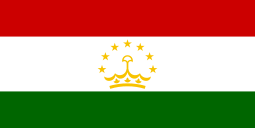Flag of Tajikistan
 | |
| Name |
Tajik: Парчами Тоҷикистон/Parcami Toçikiston Persian: پرچم تاجیکستان |
|---|---|
| Use | National flag |
| Proportion | 1:2 |
| Adopted | 24 November 1992[1] |
| Design | A horizontal tricolor of red, white and green; charged with a crown surmounted by an arc of seven stars at the center |
The national flag of Tajikistan (Tajik: Парчами Тоҷикистон / Parcami Toçikiston, Persian: پرچم تاجیکستان) was adopted in November 1992, replacing the flag of the Tajik Soviet Socialist Republic of 1953. It is a horizontal tricolor of red, white and green with a width ratio of 2:3:2, charged with a crown surmounted by an arc of seven stars at the centre.[2]
The tricolor preserves the choice of colors in the Tajik Soviet flag.
National flag
The middle white stripe has one-and-a-half times the width of the red and green stripes. The red represents the unity of the nation; the green represents the fertile valleys, while the white represents both the snow and ice of the mountains and the colour of cotton.[2][3]
The crown and stars are set in a rectangle taking up 80% of the flag's total width. The crown represents the Tajik people, as the name Tajik is connected with Persian tâj "crown" in popular etymology.[4]
Presidential Standard

The Standard of the President of Tajikistan was introduced in 2006, on the occasion of the inauguration ceremony for the third term of Emomali Rahmon as head of state. It uses the same tricolour, charged with a depiction of the Derafsh Kāviān, the Sasanian royal standard; inside the Derafsh Kāviān is a depiction of a winged lion against a blue sky under a smaller representation of the crown and seven stars.[5]
Historical flags
The first specifically Tajik flag was introduced in 1929, for the Tajik Autonomous Soviet Socialist Republic. Before that, Tajikistan had been part of the Bukharan SSR (partly transferred to the Turkestan SSR in 1924); before the Russian revolution it had been part of the Emirate of Bukhara (since 1873 a protectorate of the Russian Empire).
.svg.png) | 1929 | First flag of the Tajik Tajik ASSR | Adopted on February 23, 1929, and, with the coat of arms in the top-left corner. |
.svg.png) | 1929-1931 | Flag of the Tajik ASSR | |
 | 04.1929-24.02.1931 | Flag of the Tajik ASSR | |
 | 24.02.1931-04.07.1935 | Flag of the Tajik SSR, Latin script | |
 | 04.07.1935-26.05.1936 | Flag of the Tajik SSR | Latin script, with hammer and sickle |
 | 26.05.1936-1938 | Flag of the Tajik SSR | Latin and Cyrillic script |
 | 1938-28.09 1940 | Flag of the Tajik SSR | Latin (RSS Tocikiston) and Cyrillic script |
.svg.png) | 28.09 1940-1953 | Flag of the Tajik SSR | Cyrillic script only, in Tajik ( РСС Тоҷикистон) and Russian (Таджикская ССР). |
 | 20.04.1953-09.09.1991 | Flag of the Tajik SSR | A red banner with a large white and small green stripe in the middle (below the gold hammer and sickle). The colours are a nod to the republic's Persian culture. |
.svg.png) | 20.04.1953-11.24.1992 (Reversed) 10.9.1991-11.24.1992 | Flag of the Tajik SSR | Without hammer and sickle, also reversed flag. Following the events of the failed coup in Moscow, Tajikistan declared independence from the Soviet Union. |
See also
References
- ↑ Alfred Znamierowski: Flagi świata: ilustrowany przewodnik. Warszawa: Horyzont, 2002, s. 45. ISBN 83-7311-410-6
- 1 2 Embassy of Tajikistan to Belgium State Symbols "The crown and a star are entered in a rectangle, the sides of which on a vertical make 0,8 and across 1,0 width of a white stripe. Five-pointed stars are entered in a circle with diameter 0,15 and settle down on an arch radius of 0,5 width of a white stripe. There are three colors on a flag of the Republic of Tajikistan: green, red and white. A green stripe are valleys, they are not enough in republic - 7 % of territory. Because the rest of the territory is occupied by mountains. The white stripe is a color of the main richness of republic - cotton and also the color of snow and ice in high mountains. The red color is a color of unification of republic and brotherhood with other nations of the world."
- ↑ cotton, traditionally the main export commodity of the economy of Tajikistan, accounted for 13% of Tajikistan's exports in 2012 (now the second most important export category, behind aluminum at 55%).
- ↑ The actual etymology of the name is unknown; it derives from a medieval exonym applied to a people of the Transoxania region, used to refer to either "Arabs" or "Persians"; according to the Library of Congress's 1997 Country Study of Tajikistan, it is difficult to definitively state the origins of the word 'Tajik' because the term is "embroiled in twentieth-century political disputes about whether Turkic or Iranian peoples were the original inhabitants of Central Asia." Library of Congress Call Number DK851 .K34 1997. The supposed connection of Tajik with tajvar "crowned" can be traced to 1990 (Echo of Islam, Issues 183-193, Ministry of Islamic Guidance, 2000, p. 54). The flag design being based on this etymology was reported in Alfred Znamierowski, The world encyclopedia of flags, Hermes House, 2002, p. 169.
- ↑ Based on a Russian-language description of the flag posted at president.tj in 2006 (archived version from 2007).
External links
| Wikimedia Commons has media related to Flags of Tajikistan. |